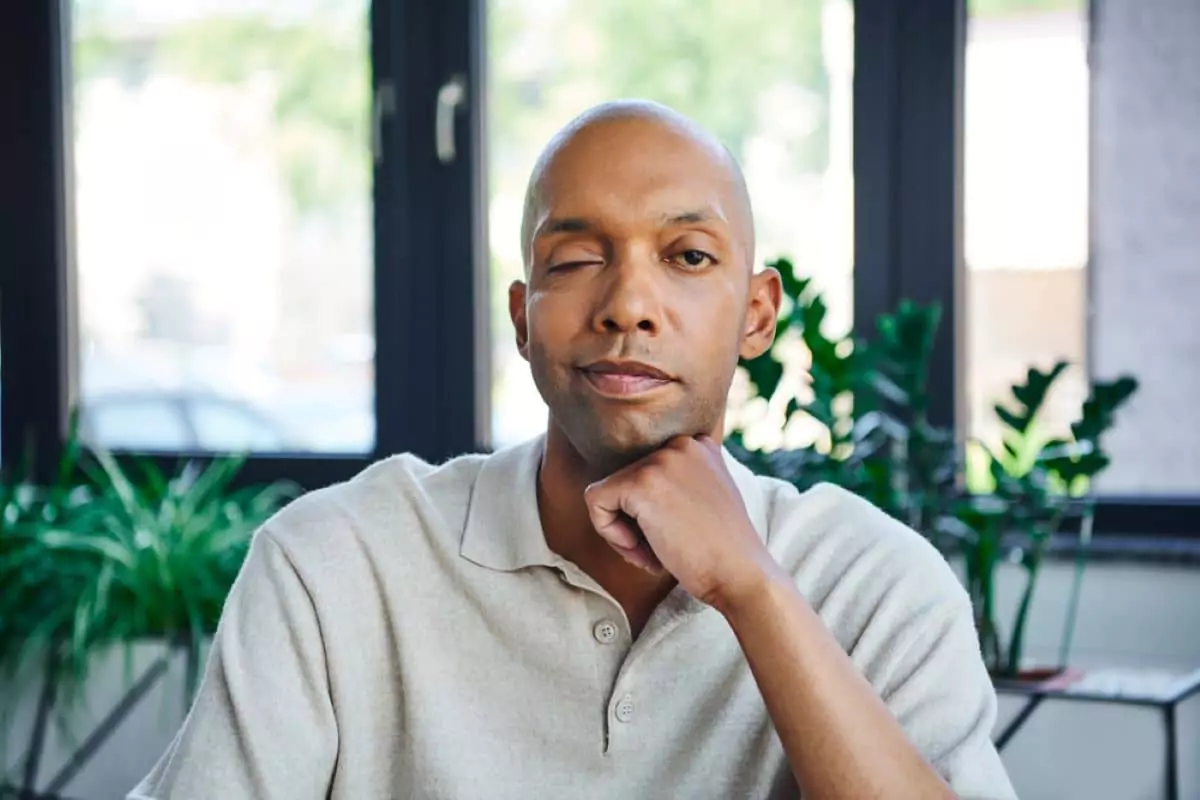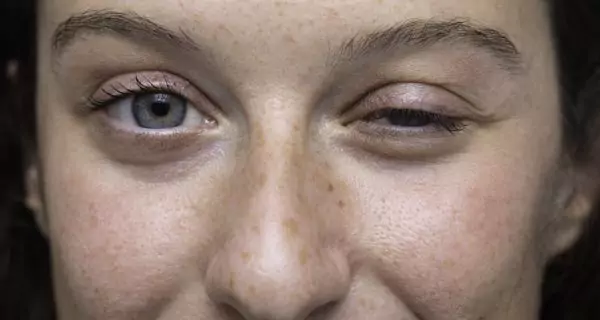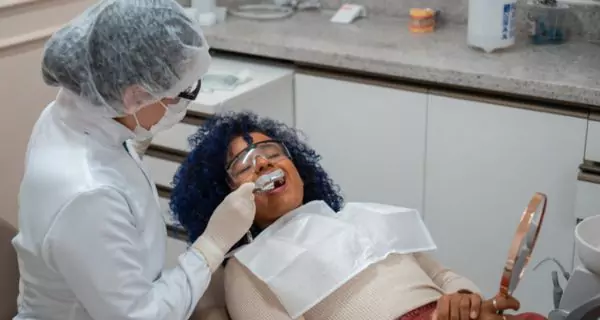Last Updated on: 19th September 2025, 12:30 pm
Myasthenia gravis (MG) is an autoimmune disease that makes your muscles feel weak. This isn’t just about feeling tired; it affects functions like eating, talking, and even smiling. As for your oral health, it can make brushing harder, cause dry mouth, and increase the chance of gum disease, cavities, or mouth infections.
Living with myasthenia gravis (MG) can be a real challenge. You might wake up feeling well, but as the day goes on, even basic activities like chewing, swallowing, or speaking become tiring. Keeping your mouth closed or smiling may take more effort than expected.
MG gradually weakens the muscles, including those involved in oral function; this makes it harder to maintain good dental hygiene and overall comfort.
If you or someone close to you is living with this condition, this article will help you understand how MG affects oral health and what steps you can take to improve daily quality of life.
What is myasthenia gravis?
Myasthenia gravis is a disease that causes the muscles to become weak. It happens because the immune system makes a mistake and creates antibodies that attack a part of the body that helps muscles move.
That part is called acetylcholine, a chemical substance that carries the message from nerves to muscles. When that signal is blocked or damaged, the muscles don’t work properly. This leads to tired muscles, especially in the face, mouth, neck, and arms.
How common is myasthenia gravis?
Myasthenia gravis is considered a rare condition, but it still affects many people around the world.
According to the Myasthenia Gravis Foundation of America (MGFA) and the National Organization for Rare Disorders (NORD), MG affects about 150 out of every 1 million people worldwide. In the United States alone, it’s estimated that around 82,700 adults live with the condition.
MG tends to affect women under 40 and men over 60 more often, although it can appear at any age.
What are the common symptoms of myasthenia gravis?
Myasthenia gravis mostly affects voluntary muscles: those we use to move, speak, eat, or smile. Muscle weakness often worsens with effort and improves with rest. Many afflicted feel fine in the morning but notice increased weakness as the day goes on.
Not all patients have the same symptoms, but here are the most common ones.
How does MG affect the muscles of the face and mouth?
- Drooping eyelids and double vision can appear early in the disease.
- Weak jaw and facial muscles make chewing and speaking harder.
- Swallowing problems may cause food to stay in the mouth.
- The tongue may look flat or have grooves, and mouth sores can occur.
What other parts of the body are affected?
- Neck weakness can make it hard to hold the head up.
- Arms and legs may feel tired, especially after physical activity.
- In severe cases, breathing muscles can weaken, requiring urgent care.
Why is oral hygiene more difficult for people with MG?
People with MG face many challenges in keeping their mouths healthy. Muscle weakness, fatigue, and certain medications can make daily oral hygiene and dental treatments more difficult.
Why can brushing and flossing be challenging?
- Weakness in the arms, hands, or facial muscles can make brushing and flossing tiring and less effective.
- Keeping the mouth open for long periods can also be exhausting.
Why does dry mouth occur with myasthenia gravis?
- Some MG medications often reduce saliva flow, leading to dry mouth, which increases the risk of cavities, gum disease, fungal infections, and mouth sores.
How do swallowing issues affect oral health?
- Trouble swallowing or moving the tongue can leave food in the mouth, encouraging bacterial and plaque growth.
- Leftover debris raises the risk of gum inflammation and tooth decay.
How should dental treatment be adapted for myasthenia gravis?
People with myasthenia gravis (MG) often find dental visits tiring and stressful. Dental professionals must adapt treatment to accommodate fluctuating muscle strength and ensure a calm, supportive environment.
When is the best time for a dental appointment?
- Morning visits are ideal, since muscle strength is usually higher earlier in the day.
- It’s best if the patient takes their medication about 1 to 1.5 hours before the visit.
- Appointments should be short and include breaks, taking place in a quiet and cool environment.
What special considerations should the dentist keep in mind?
To ensure the patient is safe and relaxed during treatment:
- Use a semi-upright position with neck/head support, especially if they have swallowing issues
- Employ a rubber mouth prop and high-speed suction to reduce jaw strain and prevent choking
- Use low-intensity lighting, soothing music, and explain steps clearly to reduce stress.
- Pause frequently to allow muscle rest.
What should the dentist know about medication and anesthesia?
- Use only the minimum required anesthetic, applying it carefully.
- Choose amide anesthetics (like lidocaine or mepivacaine) and avoid ester types and bilateral blocks.
- Avoid antibiotics known to worsen MG symptoms, such as ciprofloxacin or clindamycin.
- Always coordinate medication with the patient’s neurologist before any dental procedure.
How should dental prosthetics be adapted?
- Regular dentures may feel loose and tiring for MG patients, making chewing and speaking difficult.
- Implant-supported overdentures, designed in the neutral zone (an area shaped by natural muscle movement), provide better stability and comfort.
When is hospital-based care necessary?
Dental treatments should be done in a hospital setting if the patient:
- shows severe breathing weakness
- has a history of myasthenic crisis
- suffers from serious swallowing issues
This ensures access to trained staff and emergency equipment
What preventive strategies help maintain oral health with MG?
Even with myasthenia gravis, it is absolutely possible to keep your mouth healthy. It may take a bit more effort and commitment from the patient, the dentist, and caregivers, but it can be done successfully with the right support.
Here are some helpful recommendations.
How often should you visit the dentist?
- Every 2–3 months, especially if brushing and flossing at home are more difficult.
- Studies show that frequent professional cleanings help prevent oral infections, which can trigger MG symptoms.
Why is patient education important?
- Dentists should help you match your cleaning routine to your energy levels, showing you how to brush and floss when you still feel strong.
- They should also teach you to recognize warning signals, like extreme fatigue, drooling, or swallowing trouble, so you know when to seek medical or dental help.
Early intervention is key to preventing oral infections and possible MG crises.
What tools make daily care easier?
- Electric toothbrushes with large handles can reduce the effort needed for brushing.
- Oral irrigators or interdental brushes can be easier than flossing when hand grip is weak.
- Handle adapters or extensions may help if dexterity is limited.
What oral care products are best?
- Fluoride toothpaste strengthens enamel and fights cavities.
- An alcohol-free mouthwash helps ease irritation, especially with dry mouth.
- Moisturizing gels or saliva substitutes can relieve dryness. Saliva usually buffers mouth acidity and helps prevent tooth decay.
How can you manage dry mouth?
- Chew sugar-free gum or suck on sugar-free candies to stimulate saliva.
- Drink water regularly and limit caffeine and alcohol, as both dry out the mouth.
- Use moisturizing sprays or gels and consider a humidifier at night to keep the air moist.
With these strategies and strong communication between you, your dentist, and your medical team, it’s possible to maintain a healthy mouth and improve your quality of life, even while managing myasthenia gravis.
Can the dentist also detect myasthenia gravis?
While only a neurologist can make the official diagnosis, a dentist might be the first to notice signs of MG during an exam. Catching these signs early helps ensure timely care and better health outcomes.
What signs might raise suspicion?
Look out for unexpected symptoms during a dental visit:
- chewing or speaking difficulty without a clear cause
- muscle tiredness in the mouth midway through the appointment
- floppy tongue or slow blinking
- excess saliva or trouble keeping the mouth open
If your dentist spots these, it’s important to refer you to a neurologist for confirmation and to begin coordinated care.
What role does the dentist play in ongoing care?
The dentist plays a key role in educating the patient and their families on how MG affects dental health:
- Explain how MG symptoms affect oral hygiene: weakness in the mouth, tongue, or facial muscles can make brushing and flossing hard, increasing the risk of cavities and infection.
- Teach adapted techniques and recommend helpful tools: electric toothbrushes, water flossers, and grip-friendly handles make oral care easier when muscles feel weak.
- Highlight warning signs: educate when to seek medical help for signs like unusual fatigue, swallowing difficulty, or drooling, symptoms that may indicate an upcoming MG crisis.
- Offer emotional and practical support: encourage realistic goals, recognizing and celebrating good days, while adapting routines during harder days, all with empathy and understanding.
By detecting early signs and offering personalized education and support, dentists become key partners in managing MG and preserving oral health. With this approach, patients feel confident, empowered, and cared for.
Conclusion
Living with myasthenia gravis can make brushing and dentist visits a bit harder, but with some small changes, it’s totally possible to keep your mouth healthy.
Try to find a routine that fits your energy, go to the dentist when you feel strongest, use easy tools like electric toothbrushes, and take breaks when needed.
Your dentist, your doctor, and your family are here to help. With their support, you can take care of your teeth without stress and keep smiling every day.
Frequently Asked Questions
Can myasthenia gravis affect my teeth directly?
What should I bring to my dental appointment if I have MG?
Can stress about dental care affect my MG?
Should I avoid certain dental treatments if I have MG?
What should I do if I feel too tired to brush my teeth?
Voice and Search (Q&A)
How does myasthenia gravis affect oral health?
Myasthenia gravis weakens mouth and facial muscles, making it harder to brush, floss, chew, and swallow. This increases the risk of cavities, gum disease, and infections if not managed properly.
What dental care tips help with myasthenia gravis?
Schedule dental visits in the morning, use electric toothbrushes, take breaks during care, and choose fluoride toothpaste and alcohol-free mouthwash. A dentist can also suggest tools to make brushing easier.
When should I see a dentist if I have myasthenia gravis?
See your dentist every 2–3 months or sooner if you notice mouth sores, gum swelling, difficulty swallowing, or signs of infection. Early care helps prevent complications.
Share
References
1. Dentistry and myasthenia. (n.d.). Myaware. https://www.myaware.org/dentistry-and-myasthenia
2. Myasthenia Gravis Foundation of America. (2024, October 2). What is Myasthenia Gravis?. Myasthenia Gravis Foundation of America. https://myasthenia.org/understanding-mg/what-is-myasthenia-gravis/
3. Patil, P. M., Singh, G., & Patil, S. P. (2012). Dentistry and the myasthenia gravis patient: a review of the current state of the art. Oral Surgery Oral Medicine Oral Pathology and Oral Radiology, 114(1), e1–e8. https://doi.org/10.1016/j.tripleo.2011.08.023
4. Stober, K. (2024, October 16). Myasthenia gravis Considerations in Dentistry. Myasthenia Gravis Foundation of America. https://myasthenia.org/blog/2023/08/22/myasthenia-gravis-considerations-in-dentistry/
5. Tolle, L. (2007). Myasthenia Gravis: A Review for Dental Hygienists. Journal of Dental Hygiene, Vol. 81, No. 1. https://jdh.adha.org/content/jdenthyg/81/1/12.full.pdf
-
Dr. Yeidy Carolina Mesa [Author]
DDS Yeidy Carolina Mesa Passionate Dentist | Advocate for Accessible Oral Health Education Graduating from Universidad CES in 2022, I am a dedicated general dentist with a lifelong passion for helping others and making a meaningful impact in the world. My journey into dentistry began at the age of 7, inspired by my own experience with braces and overcoming a fear of the dentist. This personal journey shaped my mission to help patients conquer their own dental anxieties and embrace a healthier,...
View all posts
-
Nayibe Cubillos M. [Medical Reviewer]
Pharmaceutical Chemestry |Pharmaceutical Process Management | Pharmaceutical Care | Pharmaceutical Services Audit | Pharmaceutical Services Process Consulting | Content Project Manager | SEO Knowledge | Content Writer | Leadership | Scrum Master
View all posts
A healthcare writer with a solid background in pharmaceutical chemistry and a thorough understanding of Colombian regulatory processes and comprehensive sector management, she has significant experience coordinating and leading multidisciplina...






















